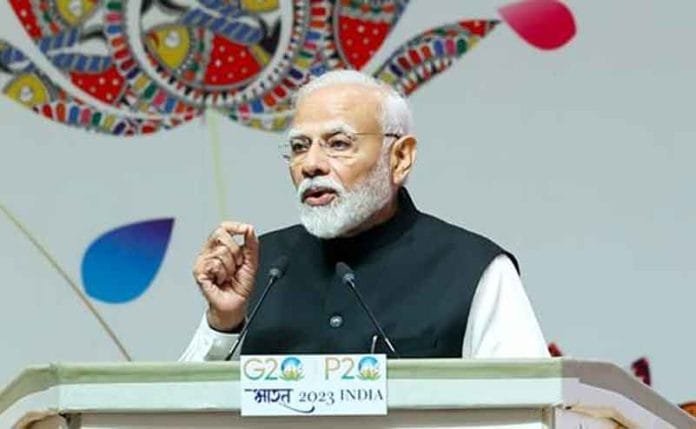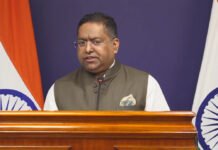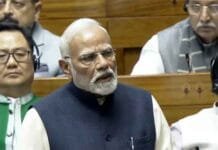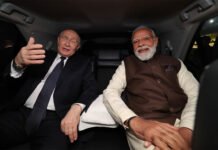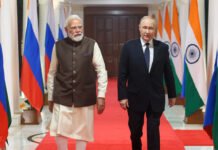INVC NEWS New Delhi — India has firmly reiterated its position on the Kashmir issue, asserting that there is no scope for third-party intervention or mediation. This strong message comes in response to recent international commentary, including from US President Donald Trump, regarding potential mediation between India and Pakistan over Kashmir. Indian government sources have made it clear that such proposals are detached from the realities on the ground and do not reflect India’s strategic or diplomatic framework.
PM Modi’s Clear Message to US Vice President JD Vance
During a recent conversation between US Vice President JD Vance and Indian Prime Minister Narendra Modi, the Indian side took a resolute stand. Prime Minister Modi emphasized that India does not require mediation, and any aggressive posture by Pakistan would be met with a decisive and proportionate response. The conversation underscored India’s firm and consistent stance on the Kashmir dispute as a bilateral matter, to be resolved only between India and Pakistan, and only under specific conditions.
This firm stand by the Indian leadership is widely seen as the reason behind Pakistan’s military de-escalation, with Pakistan’s Director General of Military Operations (DGMO) reaching out to his Indian counterpart to request a ceasefire agreement. The ceasefire was eventually formalized, reflecting India’s strategic leverage and operational superiority.
No NSA-Level Talks: India Rules Out High-Level Engagement
According to the Ministry of External Affairs (MEA), there have been no National Security Advisor (NSA)-level discussions between India and Pakistan, and there are no plans for such engagements in the foreseeable future. Only DGMO-level talks have taken place—and may occur again if deemed necessary—but these are technical in nature and limited in scope.
Ministry officials clarified that these military-level communications are not to be interpreted as holistic or comprehensive peace talks. These are tactical de-escalation mechanisms and not political dialogues.
Talks Conditional on Key Actions from Pakistan
India has laid out its clear preconditions for any forward movement in the India-Pakistan dialogue process. According to top-level sources:
Pakistan must return Pakistan-occupied Kashmir (PoK) as a non-negotiable prerequisite.
There must be credible and verifiable action against terrorist groups operating from its soil, particularly those involved in high-profile attacks such as:
The Pahalgam attack
The 26/11 Mumbai attacks
Pakistan must take decisive steps to hand over individuals associated with these and other terror-related incidents for legal prosecution in India.
Without fulfilling these non-negotiable conditions, India has stated it will not enter into diplomatic talks or consider mediation suggestions from any international entity.
Firm Policy of Bilateralism
India’s Kashmir policy has long been underpinned by the principle of bilateralism as agreed upon in the Simla Agreement (1972) and Lahore Declaration (1999). Both treaties exclude third-party mediation and affirm that any disputes will be settled bilaterally.
By rejecting external suggestions for mediation, India is defending its sovereignty, its constitutional jurisdiction over Jammu and Kashmir, and the strategic autonomy of its foreign policy.
Pakistan’s Diplomatic Strategy Fails Again
Pakistan’s repeated attempts to internationalize the Kashmir issue—through the UN, OIC, and other international platforms—have not succeeded in changing the global position. Most countries, including strategic partners like the US, France, Japan, and Australia, recognize Kashmir as an internal matter of India.
Moreover, India’s counterterrorism narrative, backed by concrete evidence, has found resonance globally. From the Financial Action Task Force (FATF) monitoring to international sanctions on terror-related organizations, the tide of global diplomacy has shifted in India’s favor.
Strengthening Borders, Not Bowing to Pressure
India continues to bolster its border infrastructure, increase its military readiness, and maintain a zero-tolerance policy on terrorism. The government has also ensured that development projects in Jammu & Kashmir continue without interruption, signaling that peace and progress will be led from within, not dictated by external actors.
The idea that foreign mediation could play a role in resolving what is clearly a sovereign issue, as outlined in India’s constitutional and diplomatic doctrine, is categorically rejected by the Indian government.
Conclusion: India’s Stand Remains Unshakable
In conclusion, India’s position on Kashmir remains unwavering:
No third-party mediation
No dialogue unless Pakistan acts against terror and returns PoK
No compromise on territorial integrity
The Kashmir issue is not one of mediation, but of justice—justice for victims of cross-border terrorism, for displaced Kashmiri families, and for the sovereign right of India to safeguard its people and land. As long as Pakistan continues to harbor terrorists and support anti-India activities, meaningful dialogue will remain off the table.
India’s message to the world is clear: Talks and terror cannot go hand in hand.

